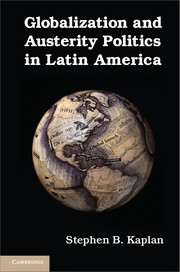Book contents
- Frontmatter
- Contents
- List of Figures
- List of Tables
- Acknowledgments
- 1 Introduction
- 2 Globalization and Austerity Politics
- 3 The Political Economy of Elections
- 4 The Electoral Boom-Bust Cycle
- 5 From Gunboat to Trading-Floor Diplomacy
- 6 When Latin American Grasshoppers Become Ants
- 7 The Political Austerity Cycle
- 8 Conclusion
- Appendix: Field Research Interviews
- Bibliography
- Index
- Other Books in the Series (continued from page iii)
8 - Conclusion
Published online by Cambridge University Press: 05 February 2013
- Frontmatter
- Contents
- List of Figures
- List of Tables
- Acknowledgments
- 1 Introduction
- 2 Globalization and Austerity Politics
- 3 The Political Economy of Elections
- 4 The Electoral Boom-Bust Cycle
- 5 From Gunboat to Trading-Floor Diplomacy
- 6 When Latin American Grasshoppers Become Ants
- 7 The Political Austerity Cycle
- 8 Conclusion
- Appendix: Field Research Interviews
- Bibliography
- Index
- Other Books in the Series (continued from page iii)
Summary
A safety-first Volvo, or a sleek Porsche speedster? In crafting economic policy, speed often trumps caution. Chief executives step on the economy's gas pedal, hoping to jolt jobs and economic growth higher. Political economy theorists expect this behavior to be most intense before elections, when politicians' survival is at risk. Indeed, electoral engineering can be an attractive political tool. Notwithstanding its potential economic costs, voters often reward free spending governments and a booming economy.
In the United States, there are many examples of politicians engineering an election-time economic boost, widely known as a political business cycle. Most recently, George W. Bush engaged in a spending spree in the prelude to the 2004 presidential elections. Courting elderly voters, Bush championed a huge Medicare subsidy for prescription drug purchases. The president also slashed taxes before his reelection campaign. Coupled with the Iraq War and homeland security spending, the government's budget balance swung from surplus to a sizable deficit between 2002 and 2004.
A similar pattern occurred during the 1972 presidential election campaign. In spite of the Vietnam War's assault on government coffers, President Richard M. Nixon cut taxes and hiked social security benefits by a whopping 20 percent in the year preceding the election. In addition to ballooning the budget deficit, Nixon also pressured the Federal Reserve to fire up the printing presses and expand the money supply. The Fed lowered its key monetary policy target at the time – the discount rate – by 1.5 percentage points between 1970 and 1972.
- Type
- Chapter
- Information
- Globalization and Austerity Politics in Latin America , pp. 277 - 290Publisher: Cambridge University PressPrint publication year: 2013



